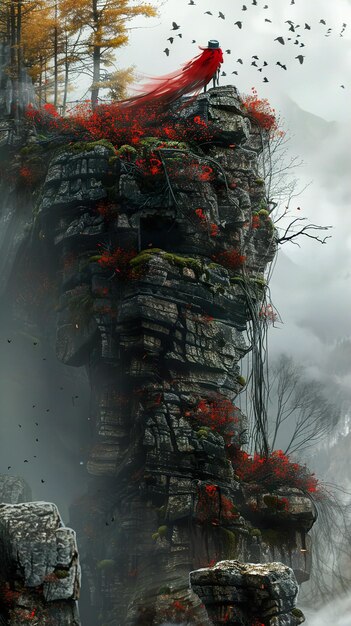CD Projekt Red & Epic Games: Unreal Engine 5 Powers Future Witcher Games

CD Projekt Red has partnered with Epic Games to leverage Unreal Engine 5 for future Witcher games, signaling a significant shift from their proprietary REDengine and promising enhanced development tools and graphical fidelity.
The gaming world buzzed with excitement as CD Projekt Red announced its partnership with Epic Games, marking a new era for the acclaimed Witcher series. This collaboration will see future Witcher titles developed using Epic’s Unreal Engine 5, a departure from CD Projekt Red’s in-house REDengine.
Cd Projekt Red Embraces Unreal Engine 5
CD Projekt Red’s decision to adopt Unreal Engine 5 represents a significant strategic shift. After years of relying on their proprietary REDengine, notably used in The Witcher 3 and Cyberpunk 2077, the studio is now looking towards Epic Games’ technology for its future endeavors. This move has sparked considerable discussion within the gaming community, with many speculating about the reasons behind this change and its potential impact on the quality and development timeline of future Witcher games.
This partnership is not just about switching engines; it’s about embracing a new ecosystem that promises enhanced development tools, improved graphical capabilities, and a more streamlined workflow. Unreal Engine 5 is known for its cutting-edge features, such as Nanite and Lumen, which allow for unprecedented levels of detail and photorealistic lighting. Let’s delve deeper into the motivations behind this strategic move and what it means for the future of The Witcher.
The limitations of REDengine
While REDengine served CD Projekt Red well for many years, it’s no secret that it came with its own set of challenges. The development of Cyberpunk 2077, in particular, highlighted some of the engine’s limitations, especially in terms of optimization and scalability for different platforms.
- Optimization Issues: REDengine struggled to maintain consistent performance across various hardware configurations, leading to widespread complaints about frame rate drops and graphical glitches.
- Development Complexity: The engine’s complexity made it challenging to implement new features and iterate on existing ones, potentially slowing down the development process.
- Scalability Concerns: Scaling REDengine to accommodate the ambitious scope of Cyberpunk 2077 proved to be a significant hurdle, contributing to the game’s rocky launch.
Recognizing these limitations, CD Projekt Red likely saw Unreal Engine 5 as a more robust and versatile solution for its future projects. The move allows them to offload some of the technical burden and focus on what they do best: creating compelling narratives and immersive worlds.
By embracing Unreal Engine 5, CD Projekt Red is signaling a commitment to leveraging the best technology available to deliver high-quality gaming experiences. The decision reflects a pragmatic approach to game development, prioritizing efficiency and performance over proprietary solutions.

Unreal Engine 5: A New Era of Visual Fidelity
Unreal Engine 5 is not just an upgrade; it’s a revolution in game development technology. Its features are designed to empower developers to create visually stunning and highly immersive worlds with greater efficiency. Two key technologies that set Unreal Engine 5 apart are Nanite and Lumen, both of which promise to elevate the graphical fidelity of future Witcher games.
Nanite allows developers to import film-quality assets directly into the engine, eliminating the need for manual optimization and dramatically increasing the level of detail that can be rendered on screen. Lumen, on the other hand, is a global illumination and reflections system that dynamically adjusts to changes in the scene, creating realistic and dynamic lighting effects.
Key Features of Unreal Engine 5
Unreal Engine 5 is packed with features designed to streamline the development process and enhance the visual quality of games. Here are some of the most notable:
- Nanite Virtualized Geometry: Enables the import of high-resolution assets without performance compromise.
- Lumen Global Illumination: Creates dynamic and realistic lighting effects in real-time.
- MetaHuman Creator Integration: Simplifies the creation of highly realistic digital humans.
- Enhanced Animation Tools: Provides advanced tools for creating lifelike character animations.
These features, combined with Unreal Engine 5’s intuitive interface and extensive documentation, make it an attractive choice for CD Projekt Red as they embark on their next Witcher adventure. The engine’s capabilities will allow them to push the boundaries of visual fidelity and create a truly immersive and unforgettable gaming experience.
The adoption of Unreal Engine 5 marks a significant step forward for CD Projekt Red, enabling them to leverage cutting-edge technology to create even more visually stunning and immersive games.
The Future of The Witcher Series
The partnership between CD Projekt Red and Epic Games has significant implications for the future of The Witcher series. By leveraging Unreal Engine 5, the studio can focus on enhancing the game’s core elements, such as storytelling, character development, and world-building, without being bogged down by the technical challenges of maintaining a proprietary engine.
One of the most exciting prospects is the potential for more frequent releases and improved development timelines. Unreal Engine 5’s robust toolset and streamlined workflow could allow CD Projekt Red to iterate on ideas more quickly and bring new Witcher games to market faster than before.
The use of Unreal Engine 5 could lead to faster production cycles and a greater emphasis on storytelling, ensuring that the heart of The Witcher series remains intact.
Potential benefits for The Witcher series
The switch to Unreal Engine 5 opens up a range of possibilities for The Witcher series, from improved graphics and performance to more efficient development processes. Here are some of the key benefits:
- Enhanced Visuals: Unreal Engine 5’s Nanite and Lumen technologies will allow for unprecedented levels of detail and realistic lighting.
- Faster Development: The engine’s streamlined workflow and extensive toolset could shorten development times.
- Improved Performance: Unreal Engine 5 is designed to optimize performance across a wide range of hardware configurations.
These benefits suggest that future Witcher games will not only look better but also be more polished and optimized, providing a smoother and more enjoyable gaming experience. The move to Unreal Engine 5 is a strategic investment in the future of the series.
By embracing Unreal Engine 5, CD Projekt Red is setting the stage for a new era of The Witcher games, one that is characterized by stunning visuals, compelling storytelling, and efficient development practices. The future looks bright for fans of the series.

Long-Term Strategic Implications
The partnership between CD Projekt Red and Epic Games is not just about the current Witcher project; it’s a long-term strategic alliance that could shape the future of both companies. By aligning themselves with Epic Games, CD Projekt Red gains access to a wealth of resources, expertise, and support, while Epic Games strengthens its position as the leading provider of game development technology.
This collaboration could also lead to further cross-promotion and integration between the two companies, potentially opening up new avenues for revenue generation and audience engagement. For example, we might see exclusive Witcher content appearing in Fortnite or other Epic Games titles.
The long-term strategic implications of this partnership extend beyond the immediate benefits, positioning both companies for continued success and innovation in the gaming industry.
How this partnership benefits both companies
The alliance between CD Projekt Red and Epic Games is a win-win situation, with each company benefiting in unique ways:
- CD Projekt Red: Gains access to cutting-edge technology, reduces development costs, and streamlines workflow.
- Epic Games: Strengthens its position as the leading provider of game development technology and gains valuable feedback from a top-tier studio.
- Both: Potential for cross-promotion, shared knowledge, and collaborative innovation.
This strategic alignment positions both companies for long-term success in the rapidly evolving gaming landscape. The decision to embrace Unreal Engine 5 is a forward-thinking move that will benefit both CD Projekt Red and Epic Games.
The partnership between CD Projekt Red and Epic Games is a testament to the power of collaboration and the importance of leveraging the best technology available. As the gaming industry continues to evolve, these types of strategic alliances will become increasingly common.
The Impact on the Gaming Industry
The decision by CD Projekt Red to switch to Unreal Engine 5 is likely to have a ripple effect throughout the gaming industry. Other studios may now be more inclined to consider Unreal Engine 5 for their own projects, leading to greater standardization and interoperability across different games.
This could also lead to increased competition among engine providers, driving further innovation and improvement in game development technology. The adoption of Unreal Engine 5 by a studio as prominent as CD Projekt Red sends a clear message that the engine is a viable and attractive alternative to proprietary solutions.
The gaming industry is constantly evolving, and the decision by CD Projekt Red to embrace Unreal Engine 5 is a sign of things to come, heralding a new era of collaboration and innovation.
Potential industry-wide effects
The switch to Unreal Engine 5 by CD Projekt Red is likely to have far-reaching effects on the gaming industry:
- Increased Adoption of Unreal Engine 5: Other studios may follow suit, leading to greater standardization.
- Greater Innovation: Competition among engine providers could drive further innovation in game development technology.
- Improved Interoperability: Games built on the same engine may be easier to port and adapt to different platforms.
These potential effects underscore the significance of CD Projekt Red’s decision and its potential to reshape the gaming landscape.
The gaming industry is constantly evolving, and the decision by CD Projekt Red to embrace Unreal Engine 5 is a sign of things to come, heralding a new era of collaboration and innovation.
Challenges and Considerations
While the move to Unreal Engine 5 offers numerous benefits, it also presents some challenges and considerations for CD Projekt Red. The studio will need to invest time and resources in training its staff on the new engine and adapting its development pipeline to the Unreal Engine ecosystem.
There may also be some initial teething problems as the studio gets to grips with the new technology and figures out how to best leverage its capabilities. However, these challenges are likely to be outweighed by the long-term benefits of the partnership with Epic Games.
Addressing these challenges head-on will be crucial for CD Projekt Red to fully capitalize on the potential of Unreal Engine 5 and deliver the high-quality Witcher games that fans expect.
Potential hurdles for CD Projekt Red
The transition to Unreal Engine 5 is not without its potential challenges:
- Training and Adaptation: Staff will need to be trained on the new engine.
- Initial Teething Problems: Integrating a new engine into the development workflow takes time.
- Existing Assets: Adapting existing assets from REDengine to Unreal Engine 5 may require additional work.
These hurdles are manageable, but they will require careful planning and execution on the part of CD Projekt Red.
Despite these challenges, the long-term benefits of the partnership with Epic Games are likely to outweigh the initial difficulties. By addressing these challenges head-on, CD Projekt Red can ensure a smooth and successful transition to Unreal Engine 5.
| Key Point | Brief Description |
|---|---|
| engine switch ✅ | CD Projekt Red moves from REDengine to Unreal Engine 5. |
| visuals ⬆️ | Unreal Engine 5 enhances graphical fidelity with Nanite and Lumen. |
| ⏱️dev time | Faster development cycles due to UE5’s robust toolset. |
| 🤝Strategic alliance | Long-term implications for both CD Projekt Red and Epic Games. |
Frequently Asked Questions
CD Projekt Red opted for Unreal Engine 5 to leverage its advanced features and streamline development, moving away from its proprietary REDengine due to optimization and scalability challenges.
Unreal Engine 5 will enhance visuals with technologies like Nanite and Lumen, allowing for higher detail and more realistic lighting, resulting in a more immersive gaming experience.
The engine switch aims to potentially shorten development cycles, leading to faster releases of new titles, thanks to Unreal Engine 5’s robust toolset and efficient workflow.
Key benefits include enhanced visual fidelity, streamlined development processes, improved performance optimization, and the potential for greater innovation in game design and creation.
Challenges include training staff on the new engine, adapting existing assets, and overcoming initial integration issues, but the long-term advantages outweigh these short-term hurdles.
Conclusion
The partnership between CD Projekt Red and Epic Games, marked by the adoption of Unreal Engine 5 for future Witcher games, signals a significant shift in the gaming landscape. This strategic alliance promises enhanced visual fidelity, streamlined development, and potential benefits for both companies, setting the stage for an exciting new era for The Witcher series and the gaming industry as a whole.





